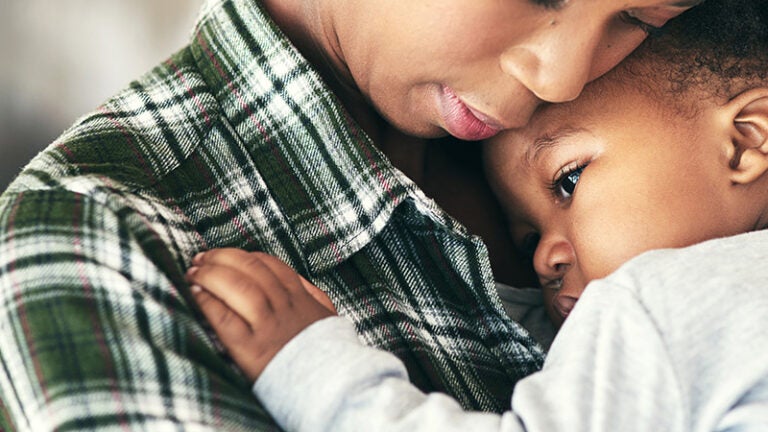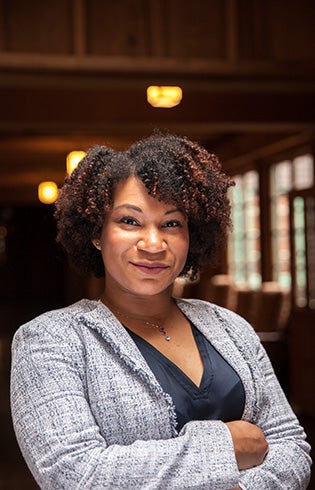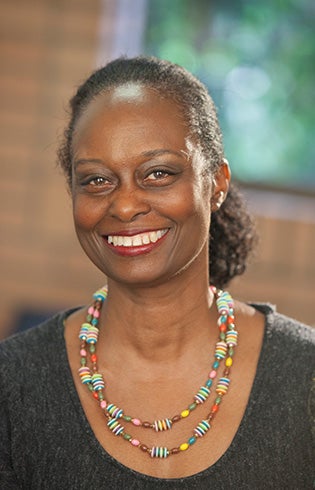
The pandemic echoes a history of disruption for Black families, stretching back to slavery
Since the COVID-19 pandemic began, the disease has killed approximately 1 of every 1,000 Black Americans — about twice the rate of death among white Americans killed by the disease.
Black men have been especially affected. Early research shows that COVID-19 kills men at nearly twice the rate of women, earning it a reputation as a “global mankiller.” Communities across America are reporting a devastating number of Black men struck down by the disease, men who played important roles as husbands, fathers, community leaders and parental caretakers.
Facebook groups for Black widows have seen an influx of new members since the start of the pandemic. In addition to grappling with grief, widows are shouldering increased responsibilities. They’re now parenting children as single mothers, assuming the role of sole breadwinner and assisting elderly relatives without male support.
Even for those whose partner did not succumb to the disease, many Black women face years of caring for a family member who might suffer from the long-term complications. Such disruption, and the increased burden on Black women, connects to a long history of separation and disruption within the Black American family.
From plow to prison

Alaina Morgan (Photo: Courtesy Alaina Morgan.)
During nearly 250 years of slavery in the United States, enslaved persons were frequently torn from their family members. Women were separated from their children on the auction block. Men and women could be sold from one plantation to another.
“The entire structure of slavery supported the separation and the ongoing fragility of the Black family,” says Alaina Morgan, assistant professor of history at the USC Dornsife College of Letters, Arts and Sciences. After slavery ended, plantation-owners turned to “convict-leasing” to fill the gap in cheap labor. Black Codes, laws that severely restricted the rights of Black Americans, made it easy for the state to imprison them for petty offenses and then lease prisoners to plantation owners for a fee.
“After slavery, you see Black men and women taken away from their families, oftentimes for really minor, nonviolent crimes. It could be something as simple as not having a work pass,” says Morgan.
Although convict-leasing has been mostly phased out, prison labor is still alive and well, with everything from artisanal goat cheese to party balloons produced by incarcerated people. Black Americans, especially Black men, continue to be imprisoned at much higher rates than other Americans and serve longer sentences than white Americans.
A 2016 study found that 1 in 4 Black children have a parent that is or has been incarcerated, which increases their likelihood of dropping out of school, developing learning disabilities and exhibiting disruptive behavior in class.
When a family member is jailed, women are frequently the one to provide financial support to the incarcerated, paying on average some $13,000 in fines and fees to the court system. This makes paying regular bills, rent and childcare expenses nearly impossible for women supporting a family on their own.
Plague times
Now, disease is ravaging the Black family. Black men are experiencing a drop in life expectancy not seen since World War II. A complex layering of risk factors, exacerbated by institutionalized inequality, seem the likely cause.

April Thames (Photo: Courtesy April Thames.)
Black men are often employed as essential workers in factories, retail stores and public transit, exposing them to the virus. Many live in multi-generational housing where physical distancing can be difficult. They have high rates of obesity, diabetes and heart disease that worsen COVID-19. Then, there’s the pent-up toll on the body from facing daily racism.
Research by April Thames, associate professor of psychology and director of the Social Neuroscience in Health Psychology Lab, found that racist experiences are associated with genes that increase inflammation in the body, making people more susceptible to illness.
Incarceration and COVID-19 have also collided, says Morgan, to devastating effect. In mid-August, correctional facilities accounted for the top 10 outbreak cluster sites for COVID-19.
“We already have a crisis in which Black men [are sent to prison] and removed from Black communities, causing a host of developmental issues and depriving Black communities of income. Now we have an epidemiological crisis where Black men are dying and leaving women alone forever because they’re never coming back from prison,” says Morgan.
A woman whose partner survived a bout of COVID-19 may still find herself with extra duties if the partner suffers long-term damage such as respiratory and heart issues. Some effects may be mental, adding another challenge to caregiving.
“Colleagues of mine have noticed that people who have pre-existing mental health conditions, like post-traumatic stress disorder, which we know is very prominent in the Black community, coupled with COVID-19 have worse mental health outcomes,” says Thames.
This woman’s work
With these deaths, Black women must once again step up to the plate, acting as single mothers and sole income-earners, and filling in gaps in the community left behind by the dead. Some of this female leadership is routine for the Black community, says Morgan, and part of a long tradition of matriarchal culture.

Donna Benton (Photo: Courtesy Donna Benton.)
“The vast majority of enslaved persons were transported from West and West Central Africa, where there are quite a few matrilineal societies where property and kinship were passed through women,” says Morgan. “We see women in positions of leadership, including acting as rulers and advisors in the region.”
However, positioning Black women as especially strong can be a troublesome stereotype with origins in slaveholding.
“Black women were working and doing hard labor in the fields while pregnant or immediately after having babies. This was seen as both a lack of care for their children and also a superhuman ability that justifies continuing to abuse Black women,” says Morgan. This dynamic is still present today in perceptions of Black women as less devoted mothers, she adds.
“While the ability to be resilient is a strength of Black women, it also sometimes leads to delayed handling of trauma and coping with losses,” says Donna Benton, research associate professor of gerontology and director of the USC Family Caregiver Support Center at the USC Leonard Davis School of Gerontology, and a member of the USC Center for the Changing Family, headquartered at USC Dornsife.
Justice and healing for all
Local and federal governments should play a role in assisting the women who will be coping with widowhood and caregiving in the coming years, says Benton. Providing funds for funeral costs, arranging paid leave for bereavement and allowing the time a person acts as a caregiver to serve as credit for social security working hours could help ease the financial burden for Black women.
Thames believes that extending access to health care, especially telehealth, is necessary to prevent deaths in the Black family. In June, Thames’ father died of a heart attack in rural Mississippi, unable to find care. Many hospitals in small-town America have closed in recent decades, leaving those that remained overwhelmed and understaffed, especially during the pandemic.
“If you have a lot of resources you can get in. If you don’t, and you’re living in a very rural area and you’re a Black man, good luck being seen,” says Thames.
Morgan foresees the matrilineal kinship network once again playing a role, as widowed women turn to aunties, grandmothers and sisters to help them carry the burden. Black women will continue to soldier on together, despite their grief.
“Black women have kept on going because we have to keep on going — we don’t really have a choice,” says Morgan.